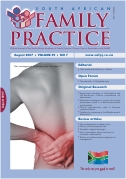The role of educational strategies to reverse the inverse performance spiral in academically isolated rural hospitals
Keywords:
Continuous professional development, rural doctors, education, retention
Abstract
The importance of continuous professional development for health care workers is widely acknowledged, but the identification of optimal implementation strategies remains a challenge, particularly in academically isolated rural areas. We report the results of a qualitative study that evaluated the effect of an educational intervention aimed at rural doctors in the Western Cape Province, South Africa. We also present a conceptual framework for developing best practice educational strategies to reverse the inverse performance spiral in academically isolated rural hospitals. Doctors felt that participation in relevant learning activities improved their competence, increased the levels of job satisfaction they experienced, increased their willingness to stay in a rural environment, and impacted positively on the quality of services provided. However, the success of educational strategies is heavily dependant on the local environment (context), as well as the practical applicability and clinical relevance of the activities (process). Successful educational strategies may help to reverse the inverse performance spiral previously described in academically isolated rural hospitals, however, this requires effective local leadership that creates a positive learning environment and supports clinically relevant learning activities. The study findings also indicate the need for health care providers and institutions of higher education to join forces to improve the quality of rural health care.
Published
2007-08-02
Section
Original Research
By submitting manuscripts to SAFP, authors of original articles are assigning copyright to the South African Academy of Family Physicians. Copyright of review articles are assigned to the Publisher, Medpharm Publications (Pty) Ltd, unless otherwise specified. Authors may use their own work after publication without written permission, provided they acknowledge the original source. Individuals and academic institutions may freely copy and distribute articles published in SAFP for educational and research purposes without obtaining permission.

